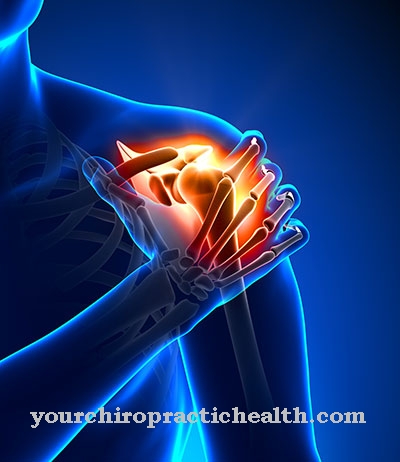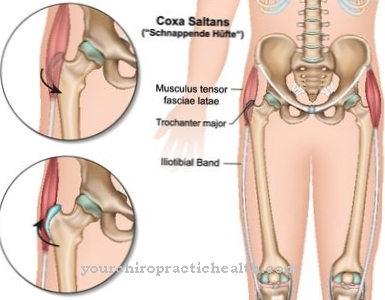The Pneumatosis intestinalis is a very rare disease with gas build-up in the digestive organs. Various causes are discussed. Often this condition is diagnosed as an incidental finding.
What is Pneumatosis Intestinalis?

© Goffkein - stock.adobe.com
The Pneumatosis intestinalis is characterized by the accumulation of gas in the walls of the digestive tract. The gas accumulation can occur below the serosa as well as below the mucosa. The serosa is a smooth drainage of various organs such as the pericardium, chest cavity or peritoneum.
In the case of pneumatosis intestinalis, gas can accumulate in the serosa of the peritoneum. The mucosa refers to the mucous membranes. As part of the disease, gas accumulations sometimes also form below the mucous membranes. Intestinal pneumatosis is very rare and usually the result of other underlying diseases. In addition, the disease is divided into different subcategories depending on the involvement of a particular digestive organ.
If the gas accumulates in the large intestine, the clinical picture is also known as pneumatosis coli. Furthermore, the so-called Pneumatosis cystoides intestinalis represents a special form of the disease. The term Pneumatosis intestinalis was first used in 1946 by the doctors Lerner and Gazin. The prognosis of the disease always depends on the underlying disease. The course can be harmless and almost symptom-free or even life-threatening.
causes
The causes of the disease are varied. The most common trigger is infectious colitis, which is further exacerbated by the administration of toxic drugs. Necrotizing enterocolitis can also be a trigger. An undersupply of blood in the context of an intestinal obstruction can also be the cause. Even previous endoscopic examinations are sometimes known to cause disease.
Pneumatosis intestinalis itself is therefore often a symptom of both serious and harmless diseases. In addition to bacterial or drug triggers, mechanical causes also play a role. In the case of a gastric ulcer, a narrowing of the gastric outlet (pyloric stenosis) or duodenal stenosis, gas accumulations are often generated in the walls of the digestive organs.
A further complex of causes is the weakening of the immune system. This leads to atrophy of the Peyer's plaques, which results in a loss of the intestinal wall integrity. This can lead to a secondary accumulation of gas in the intestinal wall. Biochemical, mechanical or bacterial processes are discussed for the pathogenesis. Which of the theories is correct cannot yet be clearly answered.
Symptoms, ailments & signs
The course of the disease is very variable and can even be asymptomatic in many patients. Often, however, the disease is initiated by acute diarrhea, especially if it is a bacterial previous illness. In some cases, hemorrhagic diarrhea also occurs, which is usually caused by the Shiga toxin-producing Escherichia coli.
Krohn's disease or ulcerative colitis can also lead to pneumatosis intestinalis. In pneumatosis cyctoides intestinalis, which is a special form of pneumatosis intestinalis, only the intestine is affected by these gas accumulations. This disease usually occurs secondary to a serious illness. However, 15 percent of the disease also occurs primarily without an identifiable cause.
Many digestive system diseases or conditions outside the digestive system can lead to this gas accumulation. But therapeutic interventions such as endoscopy, chemotherapy or immunosuppressive treatments can also cause pneumatosis cyctoides intestinalis. Which symptoms can be assigned to the actual pneumatosis intestinalis or a specific underlying disease is often not clearly identifiable.
Diagnosis & course of disease
The diagnosis of pneumatosis intestinalis is made using imaging techniques. In this way, the pronounced accumulations of gas can already be determined by x-rays of the abdomen. However, if there is flatulence that has nothing to do with the accumulation of gas in the intestinal walls, a positive false result can be made.
However, with computed tomography it is possible to clearly differentiate whether it is extramural (outside the walls) or intramural (inside the walls) gas storage.
Complications
In most cases there are complications with this disease because it can only be diagnosed by chance and not early. Those affected suffer from various complaints in the stomach and intestines, which significantly reduce and limit the quality of life of those affected. Most patients complain of constant diarrhea, which can also lead to psychological complaints and even depression.
The disease Morbus Chron can also develop and make everyday life difficult for those affected. The gas accumulations lead to severe flatulence and a distended stomach. In many cases, those affected feel uncomfortable with the symptoms and also suffer from inferiority complexes or from a reduced self-esteem. The further course of the disease depends to a large extent on its cause, so that a general prediction is usually not possible.
The treatment itself takes place either with the help of a surgical procedure or the use of medication. However, this does not always lead to success. There are no particular complications with the treatment itself. In some cases, however, those affected have to rely on a special diet to avoid these symptoms.
When should you go to the doctor?
Pneumatosis intestinalis must always be examined and treated by a doctor. This disease does not self-heal. In most cases, the symptoms worsen and there are further complications if the pneumatosis intestinalis is not treated in time.
A doctor should usually be consulted if the person concerned has been suffering from diarrhea for a longer period of time and for no particular reason. There can also be strong accumulations of gas in the intestine, which can have a very negative effect on the patient's quality of life. If these symptoms persist and are not related to a food intolerance, a doctor must be consulted.
As a rule, pneumatosis intestinalis can be diagnosed by an internist or general practitioner. The further treatment method always depends on the exact causes of pneumatosis intestinalis, so that surgical intervention may also be necessary. It cannot generally be predicted whether the disease will result in a reduced life expectancy. Early diagnosis and treatment always have a positive effect on the further course of the disease.
Therapy & Treatment
The therapy of pneumatosis intestinalis depends on the underlying disease. Often a primary gas accumulation for no apparent cause does not have to be treated at all. The disease often runs without symptoms. If symptoms are present, they are usually caused by the underlying disease that caused them.
However, if it is diagnosed that there is intramural accumulation of gas, it should be determined whether it is caused by another disease and what the disease is. Pneumatosis intestinalis can sometimes even appear as the first symptom of a completely different disease. In addition to the toxic, infectious, mechanical or other inflammatory causes, a malignancy can also be the cause of pneumatosis intestinalis.
It is also important to know exactly which bacteria are present in the event of an infection. In the case of infectiously toxic courses, for example, conventional [[antibiotics] 9 cannot be used because they really promote the release of toxins. Inflammatory processes caused by autoimmune reactions against the intestine naturally require a different treatment strategy. Overall, however, the treatment of intestinal pneumatosis is rarely in the foreground, but the underlying disease.
You can find your medication here
➔ Medication for diarrheaprevention
It is not possible to give a specific recommendation for the prevention of pneumatosis intestinalis. The intramural gas accumulation is usually a consequence of an existing underlying disease, the etiology of which is different in each individual case. To reduce the risk of developing a serious health disorder, a healthy lifestyle with a balanced diet, plenty of exercise and little stress is generally recommended.
Aftercare
Since intestinal pneumatosis is detected only by chance in most cases, follow-up care measures are very limited in most cases. First and foremost, those affected should consult a doctor very early and especially at the first signs and symptoms of the disease, so that there are no other complications or further worsening of the symptoms. An early diagnosis of pneumatosis intestinalis usually has a very positive effect on the further course of the disease.
In most cases, the disease itself does not need to be treated, so that no special follow-up measures are necessary. If another illness is responsible for the symptoms of intestinal pneumatosis, it is usually treated with medication.
Those affected should ensure that they are taken regularly and that the dosage is correct in order to permanently alleviate the symptoms. When taking antibiotics, it should be noted that they should not be taken together with alcohol. Regular checks and examinations by a doctor are still necessary in order to properly monitor the current state of the disease.
You can do that yourself
Since this disease is extremely rare, people should get checked for other conditions as they may be the cause of intestinal pneumatosis. Only when the underlying disease is known can the pneumatosis intestinalis be treated and a prognosis can be made.
Very often the immune defense of the affected patient is weakened. Here, with a healthy lifestyle, the patient can do something to aid his recovery. He should eat little fast food and instead use more fruit and vegetables. A fresh diet rich in minerals and vitamins should be supplemented with plenty of fluids. Water, herbal teas and thin juice spritzers are suitable for this. One and a half to three liters a day are recommended. In addition to a healthy diet, adequate sleep and the avoidance of nicotine and alcohol are also part of an effective support of the body's immune system.
In some cases, a specific diet should also be followed to reduce symptoms of intestinal pneumatosis, such as flatulence or a bloated stomach. Those affected can get advice from their doctor here, especially if the medication does not work as desired. Diverting and detoxifying measures as well as maintaining the intestinal culture can also support recovery. Doctors or alternative practitioners working in naturopathic medicine can give recommendations on this.




.jpg)

.jpg)






.jpg)

.jpg)
.jpg)











.jpg)